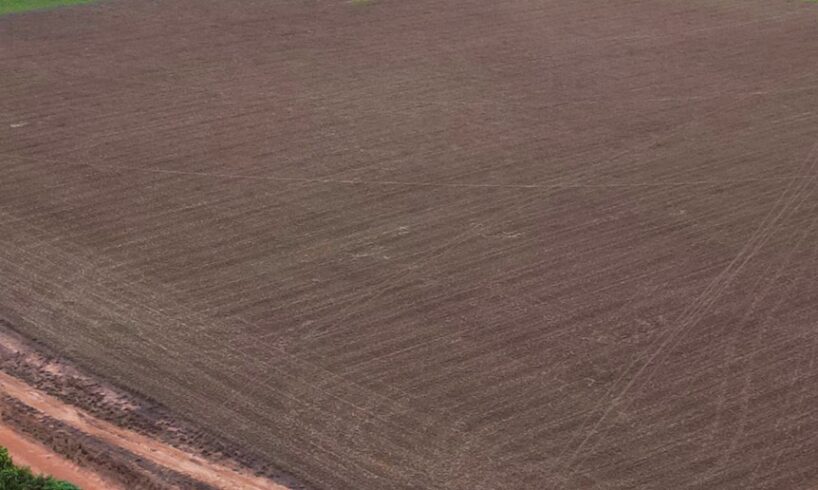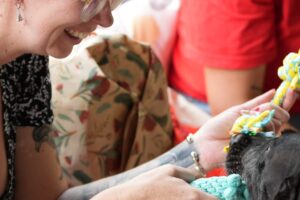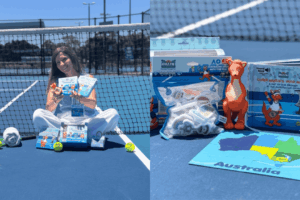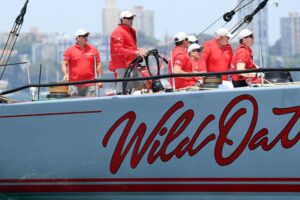
Environmental monitoring has revealed one of Australia’s largest crocodile farms is consistently irrigating with water containing levels of E. coli almost 500 times the national guidelines.
Experts have warned there is a risk the contaminated water could spread beyond the property’s boundaries, through either leaching into groundwater or being consumed by animals.
The Lambells Lagoon Crocodile Farm in Darwin’s rural area was bought for $7.25 million in 2020 with the aim of farming up to 50,000 crocodiles — a number almost half the estimated wild population of saltwater crocodiles in the Northern Territory.
The reptiles are farmed for their skins, which are used to make luxury handbags worth up to tens of thousands of dollars.
The NT property is owned and operated by PRI Farming, a subsidiary of Primary Resources Investments (PRI), a company wholly owned by French luxury brand Hermès.
Hermès crocodile-skin handbags sell for tens of thousands of dollars. (Reuters: Mario Anzuoni)
One of PRI Farming’s three directors is well-known NT businessperson Mick Burns, who is also the owner and operator of multiple other private crocodile ventures in the territory.
Documents show the farm has been irrigating crops using wastewater from its reptiles, a practice permitted under its environment protection licence.
However, monitoring reports show levels of E. coli in that water have frequently exceeded the “trigger value” set out in that licence since 2021, including in the past year.
Mick Burns, one of the farm’s co-directors, is widely known as the NT’s “crocodile king”. (ABC News: Dane Hirst)
Elevated E. coli levels recorded
In a proposal submitted to the NT Planning Commission in 2020, environmental consultants for the farm acknowledged wastewater was a challenging consideration for “intensive animal husbandry” and outlined a plan to use “modern farming techniques” to overcome the problem.
One document said crocodile wastewater would be pumped into an effluent collection pit, undergo a “coarse screening of solids followed by fine screening,” then be either directly sprayed on the land or stored in a pond for later use.
In addition to watering a large plantation of African mahogany trees, the document said the treated effluent would be used to irrigate a plantation of jarra grass, a common cattle feed in the NT.
The farm was designed to hold up to 50,000 crocodiles, making it one of the biggest in Australia. (ABC News: Michael Franchi)
Under its licence, PRI Farming must ensure E. coli levels in irrigation water do not exceed 1,000 colony-forming units per 100 millilitres (cfu/100mL) — the maximum guideline amount for irrigating animal feed in Australia and New Zealand.
But samples taken between May 2024 and April 2025, recorded in a 2025 environmental monitoring report, show that in all but one month, water used to irrigate the fodder crop contained E. coli levels far above that limit.
Environmental experts have raised concerns about the potential for groundwater contamination. (ABC News: Tristan Hooft)
The highest recording was in March this year, when E. coli levels of 3.6 billion cfu/100mL were recorded.
On average, the 2024-25 monthly samples show E. coli concentrations were 484 times the level set by the Australian and New Zealand guidelines.
Annual environmental monitoring reports from mid-2021 to mid-2024 also show elevated E. coli levels in most months, including some concentrations of over 1 billion cfu/100ml.
The 2025 report noted soil results from the past year indicated “a potential risk to both groundwater and surface water quality”.
“Nutrients and bacteria present in the soil may migrate off-site through surface runoff or infiltrate vertically into the underlying aquifer,” it said.
“While some monitoring bores show signs of localized groundwater impact, the extent of any surface water impact remains unclear due to limited available data.”
The report said the jarra grass crop was used as fodder by a “third-person farmer” who had been made aware of the high E. coli levels.
While the document mentioned a “hydrogen peroxide injection system” had been installed at the farm to reduce the irrigated wastewater’s bacterial load, it noted “bacterial concentrations remain elevated at the discharge points”.
The Lambells Lagoon Crocodile Farm is located in Darwin’s rural area. (ABC News: Tristan Hooft)
‘Substantial risks’
According to government-funded health service Health Direct Australia, E. coli is a group of bacteria found in the gut of humans and animals, some strains of which are harmful and can cause infection.
In humans, harmful strains — which can spread through contact with contaminated food or water — can cause diarrhoea, stomach cramps, nausea and fever, and in more serious cases can lead to organ damage.
Bithin Datta is a groundwater contamination expert. (Supplied: James Cook University)
An expert on groundwater contamination, James Cook University senior lecturer Bithin Datta, said the monitoring results at the crocodile farm revealed “substantial risks of contamination and ecologic risks, extending beyond the property boundary”.
He said the risk was heightened by the fractured dolomite aquifers underneath the property “which provide the pathways for water movement”.
“These aquifers are not confined and certainly interact with the surface water systems,” he said.
“Therefore even irrigation applications and, in general, wastewater spreading can lead to contamination of the groundwater.”
Ravi Naidu, a globally recognised expert in agricultural contamination based at the University of Newcastle, also said the irrigation water being discharged at the farm had the potential to spread beyond the site’s boundaries.
Ravi Naidu has studied the environmental impacts of agriculture on soil, water and air for more than three decades. (Supplied: University of Newcastle)
“Repeated application of irrigation water can easily leach into groundwater,” he said.
“The challenge, of course, is that the groundwater is not static, it moves. When it moves it can carry those potentially toxic pathogens, for instance, from this site to other receptors as well.”
He said the bacteria could migrate through underground water and contaminate bores at other nearby properties.
Ravi Naidu says irrigation water can leach into groundwater. (Supplied: University of Newcastle)
Professor Naidu also raised concerns about other ways E. coli could spread once sprayed onto grass fed to cattle.
He said wastewater sitting on the leaves of fodder represented a potential “exposure pathway” when animals ate the contaminated grass.
“From animals, for instance, for milk or meat, it could ultimately reach humans as well,” he said.
EPA determines ‘low environmental risk’
In a statement, a spokesperson for the NT Environment Protection Authority (EPA) said the regulator was aware of the “water quality exceedances” reported by PRI Farming.
However, they said the NT EPA was a “risk-based regulator” and considered the farm’s non-compliance a “low environmental risk”.
“The regulators’ focus is on high-risk activities with the highest potential to cause environmental harm,” the spokesperson said.
“In accordance with our Compliance and Enforcement policy, the non-compliance is considered low environmental risk, as the pollution is not leaving the boundary of the licensed premises.”
The NT EPA says the farm’s elevated levels of E. coli present a “low environmental risk”. (ABC News: Michael Franchi)
The NT EPA spokesperson said the NT government was conducting a review of environment protection licences for aquaculture activities, “to ensure licences are risk-based and monitoring requirements are adequate to detect potential impacts and proportionate to the environmental risk”.
They confirmed the Lambells Lagoon Crocodile Farm was included in this process.
PRI Farming and Mr Burns have been contacted for comment.
The NT EPA says a review of environment protection licences for aquaculture activities is underway. (Supplied: Brandon Sideleau)





